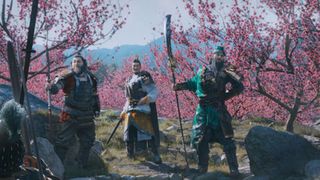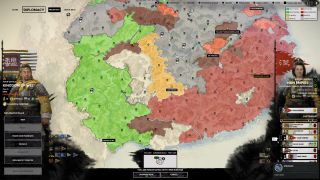Total War: Three Kingdoms beginner's guide
Some useful tips before you head into your first campaign.

Total War: Three Kingdoms is here. We've played through several entertaining campaigns ahead of launch for our Total War: Three Kingdoms review. The good news is that diplomacy is better than it has ever been, and that allows for new strategies and a fascinating game board full of vivid Three Kingdoms era warlords. Before you get started, here are a few things we learned that might help your first campaign.
Don't feed the rebels
Rebels are always a pain in Total War, forcing you to acknowledge your failures as a leader and waste time fighting your own people. They spring up in discontent provinces as a growing rabble that'll usually besiege the nearest settlement, making you divert troops to deal with them. This happens in Three Kingdoms, too, but this time there's also a complication in the form of the Yellow Turban Rebellion. It works like the other factions, competing over the empire with heroes and armies and diplomacy, but it also feeds on the rebellions popping off across the map.
In other Total War games, you can just march over to rebel-occupied settlements and kick them out, as long as you can win the battle. In Three Kingdoms, that settlement immediately joins the Yellow Turban Rebellion. Aside from their name, the random rebellions are treated as entirely separate from the faction, so you can be at peace with the Yellow Turban Rebellion and still fight rebels, but that changes moments the siege ends in their favour. If you want it back, you'll need to declare war on the faction or make a trade. It’s a whole lot of hassle that you don’t want to get into.
Keep in touch with your spies
Three Kingdoms has given Total War's espionage system a much needed upgrade, allowing you to send members of your court into the employ of other factions to do your nefarious bidding. They can create underground networks, hold office and even lead armies, all while secretly working for you. Once they're hanging around the enemy court, they can be recruited by that faction's leader and they'll play the role they're assigned. And that's how I lost track of one agent. I sent him abroad, got embroiled in a war and had no clue that he'd been given an army to lead. Not until I killed him and routed that army, anyway. He was very convincing!

Everything is colour-coded
This should become apparent pretty quickly but is still worth highlighting. Character classes, research, buildings and units are all assigned colours that correspond to the elements. Military buildings, martial research and aggressive Vanguard leaders are all red, for instance, and red units are more likely to match their general's combat style. To play to a Vanguard's strengths, you'll probably want to give them a retinue full of shock cavalry to back them up when they smash through the enemy line. Each class has an elite unit only it can recruit, but aside from that they can be mixed and matched.
Everyone goes wild for trinkets
You'll collect all sorts of personal items and followers, so many that you won't know what to do with them all. As you recruit more characters, you'll be able to arm them, give them retainers and put them on a lovely horse, but you'll inevitably end up with a pile of things you don't really need. Another might, however, so you can use any of these things to sweeten the deal when you're at the negotiating table. It's amazing what a small wooden pig can get you in return. It might be the difference between getting told to piss off and making peace. You'll probably start to get sick of all the leaders hitting you up for new toys, however, so it's a double-edged sword.
Be aggressive with your heroes
The heroic characters who join your empire are vital to the conquest of China, but that doesn't mean you should hide them behind a wall of spears. Characters serve so many functions—they could be a general, a minister and overseeing one of your provinces all at the same time—and have all these relationships that it can be tempting to keep them out of harm's way, but they are more than capable of handling themselves.
Comic deals, prizes and latest news
Sign up to get the best content of the week, and great gaming deals, as picked by the editors.
While typical historical Total War generals are just strong cavalry units with the occasional special ability, Three Kingdoms' heroes are super-charged warriors who can smash into units, lock them down and, pretty swiftly, wipe them out. Some classes are better at fighting other heroes, while others are best used with archers, but all of them can easily hold their own against several units at once. Most of what you'll be doing in a battle is moving them around, directing them to hotspots and terrifying mere mortals with devastating charges and special attacks. Legendary heroes also get unique abilities and can't be killed in battle, though they can be executed if they're captured.

Fraser is the UK online editor and has actually met The Internet in person. With over a decade of experience, he's been around the block a few times, serving as a freelancer, news editor and prolific reviewer. Strategy games have been a 30-year-long obsession, from tiny RTSs to sprawling political sims, and he never turns down the chance to rave about Total War or Crusader Kings. He's also been known to set up shop in the latest MMO and likes to wind down with an endlessly deep, systemic RPG. These days, when he's not editing, he can usually be found writing features that are 1,000 words too long or talking about his dog.
Most Popular




